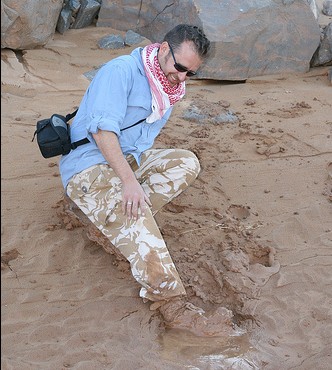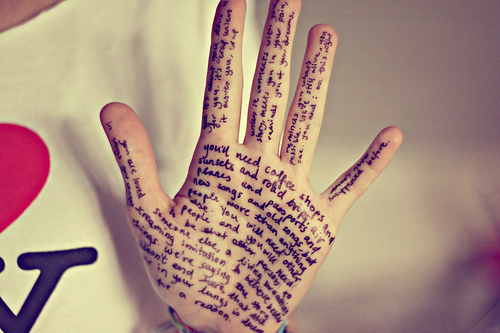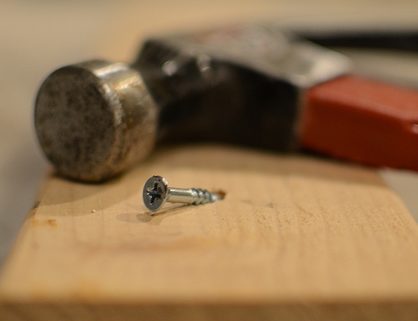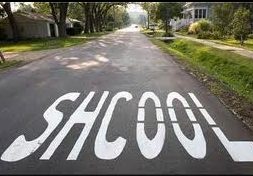Don’t Fear the Reaper: Why Writers Need Editors
Today’s guest post is from editor and author Blake Atwood:
What’s the first thing you do after writing the final word of your book’s final draft?
I push away from my computer, take a deep breath that tastes like satisfaction, then just as quickly pull myself back to my desk to send the manuscript to my editor.
It wasn’t always this way.
With the release of my first self-published book, I hesitated to even seek an editor’s help. As a first-time author, I was certain I’d never earn back the expense. Still, every podcast I’d been listening to and book I’d been reading strongly encouraged hiring an editor. So, out of two solid suggestions, I chose the least expensive editor. I’m glad to report that she enhanced the quality of my book (and that the book earned back its expenses).
After I had successfully completed the (grueling) editing process, I realized a deeper motivation had deterred me from getting an editor to look at my book, something much more terrifying than the possibility of losing a few hundred dollars.
I was afraid I would be found out as a writer.
I feared that showing my words to a professional editor would reveal me to be the naked, pompous emperor from the classic Hans Christian Anderson fairy tale “The Emperor’s New Clothes.” Upon reading my book, I was certain my editor would play the part of the blunt child in the old story and yell out, “But he isn’t a writer at all!”
If there’s one thing writers of all kinds know all too well, it’s insecurity.
I know you believe me, but in case you’re one of those (few) overly confident writers, consider these quotations from writers whose success might make us think that they seldom struggle with fear:
- “I’m afraid of failing at whatever story I’m writing—that it won’t come up for me, or that I won’t be able to finish it.” —Stephen King
- “I know it is the best book I have ever done. I don’t know whether it is good enough.” —John Steinbeck
- “Writing a book is a horrible, exhausting struggle, like a long bout of some painful illness. One would never undertake such a thing if one were not driven on by some demon whom one can neither resist nor understand.” —George Orwell
Orwell’s right, and Steinbeck echoes the same sentiment of a writer’s constant inner battle between his insecurity and wild self-confidence: “The greatest foolishness of all lies in the fact that to do it at all, the writer must believe that what he is doing is the most important thing in the world. And he must hold to this illusion even when he knows it is not true. If he does not, the work is not worth even what it might otherwise have been.”
As writers, we waver between the extremes of self-flagellation and self-adulation. We may sometimes simultaneously believe that our book is both the best and the worst thing ever written, and we’re not sure which answer most people will believe until we actually send our hard-won words off to an editor. But I can promise you—so long as you find the right editor for your book, your book will be better for having had an editor’s input.
But how do you get over that initial fear of sending your book to an editor, especially if you’re a first-time author?
First, realize what Steven Pressfield says is true: “The professional loves her work. She is invested in it wholeheartedly. But she does not forget that the work is not her.” Your book, even though it may feel like part of your soul, is not you. (This is helpful advice for when that first bad review is published too.) If you can learn early on how to separate yourself from your words, you will better serve your words, your writing career, and your emotional health.
Second, never look for validation from an editor. That’s not an editor’s job. In fact, an editor may never provide encouragement to you, at least not in the “I think this will sell millions” kind of way that your naive friends might offer. You’re not paying a professional editor in order to hear how awesome your book is. You’re paying him to make your book awesome. But to get to that point requires humility and a willingness to be shown where your writing is lacking. It requires knowing that you don’t know everything.
When warranted, some editors will provide encouragement. Such editors know what one of my friends in the publishing business said: “Editors are like good counselors. It may hurt to take the advice, but it’s worth it.” Being edited isn’t easy, but it’s what you have to do if you want your book to have the best possible opportunity of being read and selling.
Lastly, when you get back a manuscript that’s riddled in red from an editor, don’t see that as evidence you should stop writing. View it as a testimony to the fact that you’re a professional writer seeking professional help so you can produce a professional piece of art.
Today, if you have a suspicious view of editors, change your mind-set and begin considering editors the way poet and author Blake Morrison suggests: “Editing might be a bloody trade. But knives aren’t the exclusive property of butchers. Surgeons use them too.”
 Blake Atwood is the author of Don’t Fear the Reaper: Why Every Author Needs an Editor and a few other books. He’s a full-time author, editor, and ghostwriter with EditFor.me. Connect with him here on Twitter
Blake Atwood is the author of Don’t Fear the Reaper: Why Every Author Needs an Editor and a few other books. He’s a full-time author, editor, and ghostwriter with EditFor.me. Connect with him here on Twitter












Very important post, Blake! On the editing side, one of the most important lessons I learned my first few years was that encouragement is part of the process. You want authors to *want* to make the edits that need to be made. I try to keep that in mind as I work. Hopefully I succeed!
After all, we want to see the authors we work with go on to wonderful things. It’s one of the main reasons we’re in this business to begin with.
Excellent point Harrison. I have to remind myself to be encouraging and think, “If I was the one receiving the edits, how would I want to receive them?” Small words of praise can carry so much weight, especially for such a solitary endeavor as writing.
Perfect timing for me to read your article. I’m making one more pass at my manuscript before sending it to an editor after the holidays. Once I made the decision and committed to having it edited (and spending the money!) I felt relieved. I won’t stress over every detail at this point; I will send it out and welcome her feedback. Thanks for the encouragement!
Glad to be of assistance Julie. It is a commitment, but one that I hope you will be able to see great benefit from by the time your book comes to life in the real world.
Selecting the right editor is as important as selecting a publisher that’s right for you and your manuscript.
Over the past ten years, I’ve worked with several editors. All, but one, have been encouraging and supportive. One almost convinced me that I had no business writing. The feedback appeared to have been ego driven. Thankfully, my writing group prevented me from tossing the manuscript into the garbage.
It took immense courage to send my manuscript to another editor. When I did, his encouraging feedback was the juice I needed to regain my confidence. Yes, the manuscript needed work. What manuscript doesn’t? However, his positive communication gave me the juice to kick the quality of my writing up several notches.
Writers are challenged in selecting an editor. There is more to consider than simply budgetary concerns. The writer needs to find an editor with the expertise in the genre of the manuscript, and the editor has the passion to watch a writer’s talent blossom. This is key to a productive relationship and in creating a best-selling novel.
Good points Feather. In my book on editing, I constantly repeat, “Everyone needs an editor,” moreso to remind myself than anyone else. Writing is a journey without a finish line, but that doesn’t mean we can’t always strive to be better than we were yesterday.
Thank you for this post, Blake. There is a slim divide between getting feedback that is comprehensive enough and seeing your MS covered in a sea of red. Perhaps another tip would be to read the notes, walk away and stew for a day or two, allowing the suggestions to percolate, after which you will be in a better frame of mind to tackle the suggested revisions which will invariably take your work to that next level in the relentless search for perfection.
One thing I did learn over the past year, is to acquire self editing skills and edit your MS to the best of your ability before handing over to an editor. I did not have this knowledge and spent money needlessly on editing which only took my work so far but not to the point of being publishable ready.
I completely agree that all authors need an editor. My dilemma is one of cost. I don’t expect any editor to be “cheap” because what they do is very time consuming and hard work. They shouldn’t give that away. That being said, I am working on my debut novel. I have had one short story published, and it was less than 2500 words, and I rewrote it 5-6 times It was in a holiday anthology written by an author’s group that I belong to. The more experienced authors acted as editors for the stories. Back to my dilemma. I am disabled and my sole income is my disability, which is very small. I barely get by now. I really can’t afford to hire an editor. That is my problem. I simply don’t have the money to even save for editing. Yet, I don’t want to give up on my dream of writing. Do you have any suggestions? I review books from debut authors on my blog, so I do know how to read critically. It is different when you are the author though. I want to do a good job, but how do I do this without getting an editor? Thanks so much for this article. I will look for your book. 🙂
You’re in a tough spot Rebecca, but you’re also not alone. The cost of producing professional work is a barrier for many. You want to do what’s right, but circumstances prevent it.
Maybe you could swap services with someone, either by offering to edit someone else’s book while they edit yours, or by offering some other kind of service commensurate in cost to their editing price.
Alternatively, you could consider crowdfunding your book’s expenditures through a platform like Kickstarter and offer early copies and other rewards to people who choose to help back your book.
I’d be keen to hear more suggestions from others, but I hope this has given you a few options to consider.
Blake, I’m literally a bit phobic of the red ink. I’m a writer first but also an editor, so I totally know this feel first hand. Your post is great here–as is your book. Really appreciate it!
I finished Stephen King’s newest novel yesterday and he thanked his editor for all of her blue editing marks. Maybe you just need to ensure that Track Changes tracks a different color for you.
I’d recommend you run the draft through editing software such as our StyleWriter. This will give you instant feedback, help you make many changes the editor would (saving you money) and encourage you to write in a clear and readable style.
It’s great to write clearly, Nick, but software can only help you with the surface issues. It can point out a comma splice, but not a logic hole in your story or an ineffective character arc. There’s no software that can do what a developmental editor does.
The day that changes is the day Skynet wins.
I agree. Since I critique 200+ partial and complete manuscript a year, I can easily say I have yet to see one anywhere near ready to publish. Even my most successful author-clients who hit best-seller lists who send me their drafts to critique get hundreds of comments and suggestions on how to fix plot holes, tighten dialog, pick up the pacing, restructure weak storylines and subplots. Those are all things a writer needs help with from someone who knows how the spot these problem areas. Good news is, once you have this kind of work done repeatedly on your novels, you learn how to see the mistakes you make and the things you previously weren’t aware you were doing wrong or were weak in.
Great post! We need this reminder every once and a while. I’m sure we have all experienced this, as well as that frustration when an editor sends seemingly endless redlines or questions. Typically the result is a much better piece, and a lot of learning – though I have had the experience of having editors totally rewrite/rework it so my voice is lost. Once, an editor took a submission to a newspaper, and actually inserted information that wasn’t factually correct! But mostly, my experience with editors has been positive, and I use this new knowledge when I edit – my “day” job is as associate editor and senior writer of an ethnic publication. I can say for sure that we get so close to our work, sometimes we miss the obvious. That second set of eyes can catch those errors, and help to polish the piece. For example, a self-published author once sent me a book for review, and it was obvious that he skipped the editor. He said he did it to save money, and he thought he was pretty thorough with his own edit. I read it, there were countless sort of mindless errors that distracted me from the story. Also, in one chapter, the husband was supposed to be speaking provocatively to his wife, but the author inadvertently put in the name of the daughter my mistake. Ewww, gross! Imagine his horror when I told him! Long story short, don’t skip the editor! Happy Holidays and here’s to a productive 2015!
Eww indeed.
When my editor returned my book about editing back to me, I was again confronted with what you said: we get so close that we miss the obvious. I think anyone who undergoes the editing process—with a capable and confident editor—will always come out a better writer.
Editing is essential for Traditional and therefore a must for the self published. Once you get over the crush of the first blast of read ink, it gets to be quite fun. Those first turns with a ‘real’ editor give you so much ammo to prepare the next manuscript before needing an editor. I agree with the comments, don’t sidestep this very integral step. It’s the way of the great works! Don’t cheat yourself.
“By ‘editor’ I suppose you mean proofreader. Among these I have known limpid creatures of limitless tact and tenderness who would discuss with me a semicolon as if it were a point of honor—which, indeed, a point of art often is. But I have also come across a few pompous avuncular brutes who would attempt to ‘make suggestions’ which I countered with a thunderous ‘stet!’” – Vladimir Nabokov
I’m a copyeditor, and my website includes a page titled “Why Is Copyediting Necessary (http://louannpope.com/why-copyediting/).
Specifically, I address the following questions that authors often have:
If I write well, do I need copyediting?
Can readers tell when writing hasn’t been copyedited?
Doesn’t spellcheck catch everything?
Isn’t it enough for me to self-edit?
Can my friend copyedit for me?
Will a copyeditor change my voice? This is my work.
And the summary at the bottom of that page is as follows:
A copyeditor serves as the reader’s advocate: the main purpose is to ensure that your writing has achieved its intended goal, whether to entertain, inform or persuade. A skilled copyeditor will improve your manuscript’s clarity, flow, and readability—but it will still be your manuscript.
Thanks for sharing that!
“Reader’s advocate” is a great description.
Trouble is, I’m not sure I’ll ever trust an editor again. I’d written my first book, had some acquaintances (not family or friends) read the third draft before sending it off to an editor. I was excited because this particular editor works for a publishing company and I’ve seen some of her work.
Being completely ignorant about what editors are supposed to do, apart from correcting grammar, spelling, typos, and pointing out inconsistencies, I was shocked when I received my MS back and she’d completely changed the whole storyline, and even deleted huge amounts of what I thought was integral to the plot. A couple of her ideas were good, but after she finished with it, there were so many inconsistencies I couldn’t believe it. Even when I wrote to her and listed the inconsistencies, she couldn’t see a problem. I put the MS away and didn’t touch it for about six months. Then I read a book by James Scott Bell, and it stopped me from deleting every copy of the MS. I’ve almost rewritten it (again) and am happy with it so far. Now all I have to do is find a decent editor.
Lyn, so sorry you went through that. I’ve heard others have had similar situations. Since I’m a novelist and write in many genres, I am very careful not to mess with authors’ voices. I will correct mistakes, but when I note clunky writing or bigger issues, I put that in the comments and give suggestions rather than make the changes myself. One thing I would suggest is for you to pay an editor for an hour or two editing work first to see how she works. Although most writers hire me based on reputation and so hire me for a full manuscript edit, critique, and/or proofread, with clients like you who’ve had a bad experience or for those a bit unsure of just what they’re going to get from an edit, paying for an hour or two of editing will show you what you can expect and can help both you and the editor see how long it will take, on average, to edit a number of pages. I would be happy to help you have a gentle, helpful editing experience!
Lyn, it sounds to me like you’re not the one who was ignorant as to what an editor is supposed to do. A good editor will certainly delete bits that prove unnecessary, sure, but all in the name of bringing out the best in *your* vision, not theirs. This is a good argument for checking up on your editors–researching their work and speaking with past clients. So many of the people out there on the internet claiming to be editors really aren’t, or only assume they can be, and that’s where a lot of horror stories like these come from.
‘Why Writers Need Editors’ sure caught my eye. Why? Because that is the only thing on my mind now. Almost done with my Autobiography that so many have told me I need to write for those who have gone through this same ordeal.
I am one that, when determined, they will do what ever is needed. Right now I am determined to find out my next step, thus thinking of finding an Editor.
But… HOW to decide what editor.
I know a few who have had a few books published and will sure ask for their advise on finding one but hay, the more info the better, therefor googling ‘How to find the right editor’ and thus found you. — So thank you for this post. I knew I won’t feel like I’m on cloud 9 with the editors comments so reading this, how shall I say it, encouraged me not to be, well… encouraged.
I more so now know it’s what’s best to make it it’s best.
Thank you Blake.
There are some good ways to find an editor that will be right for you. Word of mouth is always helpful. Also you can pay for an hour of an editor’s time, if they charge by the hour (I do), to see how they work and if you like the way they communicate with you. I have writers do that sometimes before committing to a full edit.